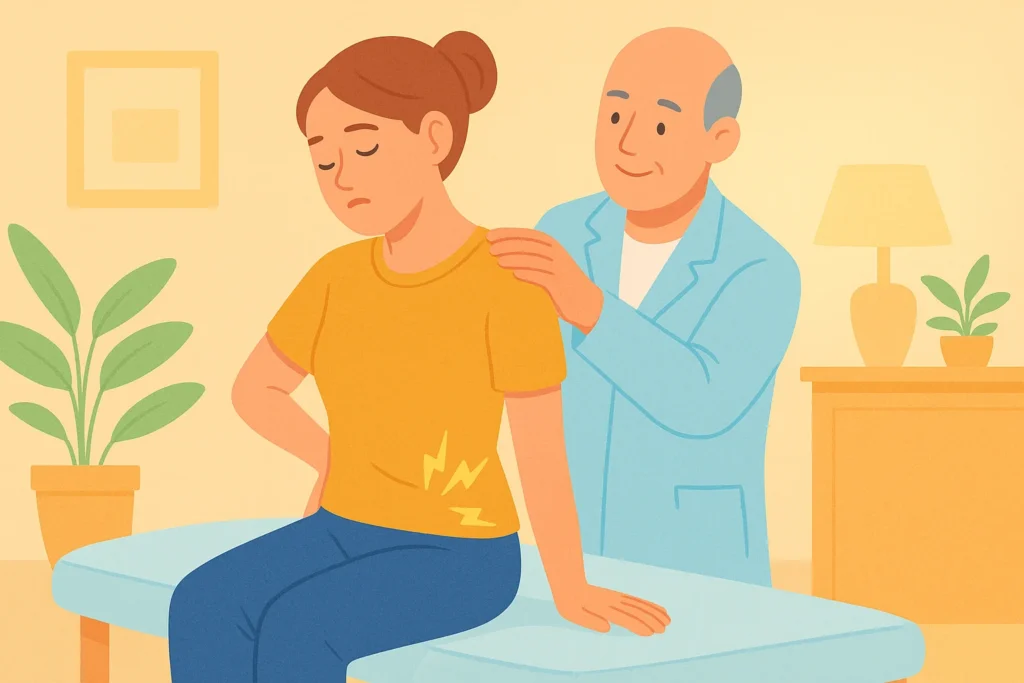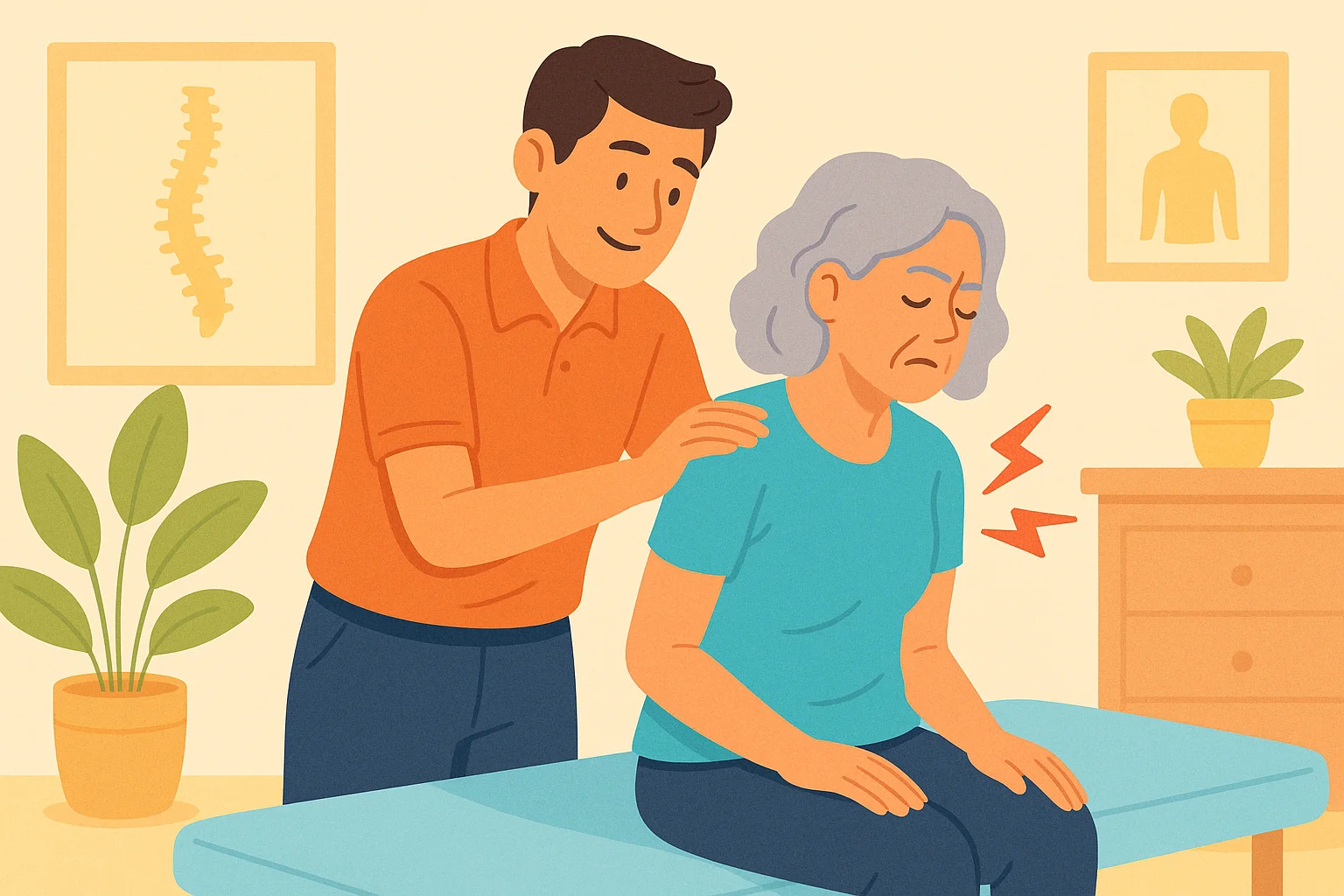Managing back pain successfully requires more than quick fixes—it calls for a strategic, patient-centered approach that combines physical, psychological, and lifestyle therapies. At Renova Wellness & Consulting, we focus on these three core pillars to ensure both immediate relief and long-term resilience.
First, we address the physical source of discomfort through personalized therapies designed to relieve tension and strengthen the spine. Whether a patient suffers from muscle strain or structural misalignment, we tailor exercises and manual techniques to restore mobility and reduce inflammation without overstressing the body.
Second, we emphasize the mind-body connection. Chronic pain can affect mood, energy levels, and overall mental health. Integrating psychological strategies like mindfulness and cognitive-behavioral therapy helps patients reframe their pain experience, empowering them to cope more effectively and regain a sense of control.
Lastly, we guide patients in adjusting their daily habits. Poor posture, prolonged sitting, and lack of movement are common contributors to recurring back pain. Our team helps patients make sustainable changes—like workplace ergonomic updates or implementing daily stretch routines—that become part of their pain prevention lifestyle.
Understanding Chronic Back Pain: Causes and Complexities
Chronic back pain isn’t just about one injury or isolated strain. It’s often the result of overlapping factors that affect the physical body, the nervous system, and psychological well-being. Renova Wellness & Consulting approaches treatment by identifying and addressing each of these contributing domains.
From a physical standpoint, common causes include muscle tightness, herniated discs, or spinal misalignments. We use physical assessments and imaging tools to pinpoint exactly where pain originates, tailoring treatment around specific anatomical needs.
In cases involving the nervous system, pain may persist long after the original injury has healed. Nerve damage, inflammation, or spinal compression can cause ongoing discomfort. Techniques like nerve glides or anti-inflammatory therapies are used to directly address these issues.
Mental health also plays a role. Chronic pain can amplify stress and, conversely, stress can worsen pain. We provide counseling and emotional support to help patients manage these intertwined challenges, ensuring that their care is as comprehensive as it is compassionate.
Core Back Therapy Techniques Used by Pain Doctors
At Renova, our specialists rely on an integrated toolbox of therapies that blend manual techniques, patient education, and progressive treatments to support the whole person—not just the symptom.
Manual therapies like spinal adjustments, therapeutic massage, or myofascial release are designed to relieve muscle tension and enhance spinal alignment. These techniques are chosen based on each patient’s specific diagnosis and response to treatment.
Education is another cornerstone of our care. Teaching patients about body mechanics, posture correction, and movement safety empowers them to become active participants in their healing journey. Small changes—like how to bend, lift, or sit—can yield significant improvements in pain reduction.
When necessary, we introduce more advanced interventions such as targeted injections. These are applied only when foundational therapies have plateaued, and always within the context of a broader rehabilitation strategy.
Debunking Myths: Why Rest Alone Is Rarely the Answer
While rest might feel intuitive when back pain strikes, prolonged inactivity often makes the problem worse. At Renova, we educate patients on why movement—not immobility—is usually the better path to recovery.
Mild activity like stretching or walking increases circulation, helping the body deliver nutrients to injured tissues and accelerate healing. In contrast, excessive bed rest can weaken muscles and delay recovery, increasing the risk of recurrence.
Maintaining strength in key support areas—like the core and glutes—is critical for offloading stress from the spine. That’s why we prioritize strength-building routines customized to match the patient’s condition and tolerance.
Psychologically, active participation in therapy improves confidence and reduces fear-avoidance behaviors, which are common in chronic pain sufferers. The more empowered patients feel, the better they are at managing pain long-term.

The Importance of Individualized Therapy Plans
Every patient’s back pain is different, which means every treatment plan should be, too. Our approach revolves around custom rehabilitation programs, emotional support, and connection to community-based healing.
A personalized physical therapy program may involve strength training, posture correction, or movement re-education. For someone with sciatica, we might focus on nerve mobilization. For another with spinal stenosis, we may prioritize flexibility and endurance.
We also integrate emotional coping tools into each plan. Back pain can be isolating and emotionally exhausting, so we provide counseling and mental health support as needed, whether through relaxation training or therapy referrals.
Lastly, we value the power of social connection. Group support or therapeutic communities provide shared accountability and encouragement. Our team encourages participation in these environments to combat isolation and reinforce consistent progress.
Advanced Pain Management: When to Consider Interventions
When conservative care isn’t enough, we consider higher-level interventions—but only within the context of a whole-person plan. Our three-pronged strategy includes targeted injections, minimally invasive procedures, and integrated follow-up care.
Injections are reserved for pain sources like inflamed joints or compressed nerves. When appropriately timed and placed, these can provide rapid relief and create space for physical rehabilitation to resume effectively.
Minimally invasive options, such as radiofrequency ablation or nerve blocks, provide an alternative to surgery. We explore these solutions only after comprehensive evaluation, ensuring that benefits outweigh risks and recovery times are reasonable.
These interventions never stand alone. We embed them within an overall care framework that includes therapy, lifestyle changes, and long-term monitoring to ensure that patients receive support on all fronts—before, during, and after intervention.
Actionable Response or Strategic Solution
Our back pain strategy at Renova emphasizes conservative beginnings, ongoing dialogue, and responsive care adaptations that match each patient’s progress.
We always start with the least invasive therapies, such as hands-on rehabilitation and medication, monitoring closely for improvements or plateaus. If progress stalls, we modify the plan quickly—because time matters when you’re in pain.
Patient education is the glue holding our strategy together. By ensuring patients understand the purpose behind every treatment and by involving them in care decisions, we foster a sense of ownership that leads to better engagement and outcomes.
Finally, we reevaluate regularly. If pain persists, we investigate new options. This flexible model allows us to pivot from physical therapy to injections, from counseling to surgical referrals, always staying aligned with what’s best for the patient in real time.
Decision Criteria or Escalation Triggers
Escalating care doesn’t mean something has gone wrong—it means the body needs more support. At Renova, we use measurable benchmarks to determine when it’s time to adjust the plan.
Pain levels are tracked using validated scales and subjective reports. A persistent spike in pain despite conservative efforts often signals the need for more aggressive therapy or advanced diagnostics.
We also monitor function. If pain continues to interfere with tasks like getting out of bed, sitting at a desk, or playing with children, we consider that a call to change direction—whether that’s revising a therapy routine or introducing a new tool.
Quality of life is the final checkpoint. When pain affects sleep, mood, or relationships, we treat those signs as seriously as physical ones. Our goal is always to restore not just mobility, but confidence and comfort in everyday living.
Support Resources or Professional Guidance
Our care team offers more than prescriptions and therapy—we provide education, personalized support, and community-based healing to enhance recovery and long-term wellness.
Every patient receives professional guidance, including one-on-one consultations with pain specialists, detailed treatment explanations, and follow-up touchpoints to answer questions and troubleshoot challenges.
We also prioritize education through handouts, workshops, and webinars. Topics range from understanding disc injuries to practical exercises for pain flare-ups, allowing patients to take informed control of their back health.
Emotional support is critical in the healing process. Whether through support groups, peer mentorship, or access to counseling, we connect patients with resources that make recovery less lonely and more hopeful.
Preventive Measures or Best Practices
At Renova, prevention is built into every treatment plan. We help patients create long-term strategies to protect their backs, maintain mobility, and avoid setbacks.
Ergonomic changes make daily life easier. Adjusting chair height, adding lumbar support, or rethinking desk setup can dramatically reduce strain. We help patients implement these tweaks in ways that feel natural, not forced.
Therapy isn’t just for recovery—it’s for prevention. Ongoing physical therapy sessions can keep muscles engaged and joints flexible, preventing stiffness and recurring injuries from taking root.
We also provide digital education tools for reinforcement between visits. Whether it’s an app with home exercises or videos about posture, we offer resources patients can revisit as often as needed to stay on track.
The Renova Philosophy on Back Pain Recovery
At Renova Wellness & Consulting, we believe every patient deserves a comprehensive recovery strategy that prioritizes evidence-based care, personal empowerment, and enduring support.
We stay anchored in clinical research. Every treatment we recommend is rooted in the latest medical findings, ensuring that patients benefit from safe and effective care, no matter their condition or pain history.
Every plan is customized. No two back pain cases are the same, so we listen closely and tailor care to meet each patient’s physical and emotional needs. That personalized attention is what fosters trust, comfort, and long-term healing.
Finally, our support doesn’t end when the pain fades. We’re here for every phase—from acute treatment to long-term maintenance. With Renova, patients don’t just recover. They reclaim their lives with strength, stability, and support.
Request your appointment today!
Questions & Answers
What makes therapy at Renova different?
At Renova Wellness & Consulting, we create a personalized treatment plan that addresses your specific back pain causes, considering your overall health and lifestyle, to ensure the most effective and sustainable relief.
Will I need advanced interventions?
Not necessarily. Our first approach is conservative, less invasive treatments. Advanced interventions are considered only if these do not provide sufficient relief and are always integrated into a comprehensive plan.
How can I prevent future back pain?
We’ll equip you with the best practices, including tailored exercises, ergonomic advice, and education on spine health, so you can manage and minimize the risk of recurring pain through lifestyle adjustments.
Renova Wellness & consulting
801-317-8522 & info@renovawc.com
10694 S River Front Pkwy, South Jordan, UT 84095
Related Articles
Chronic Pain Therapy, Pain Doctor, Back Pain Therapy Treatment, Chroni, Acute Pain Management, Chronic Pain Treatments, Alternative Therapies, Chronic Pain Managment, Chronic Pain Clinics, Long Term Pain Management, Pain Medicine





